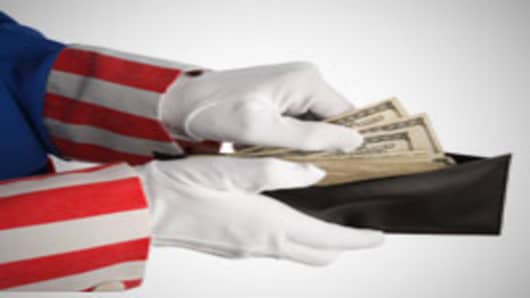Would a European-style "value-added tax" really work in the US?
Paul Volcker, a White House advisor and former Federal Reseve chairman, is pushing the idea of a national sales tax to help cut the soaring US deficit. Though the proposal faces major obstacles, it is being seriously discussed in Congress.
VAT has become a key source of revenue for countries such as France and Germany, but it hasn’t helped control spending, and the administration of the tax is heavily bureaucratic.
That's because Europe's VAT is levied during the production process, not at the checkout aisle.
If VAT rates were 10%, for instance, a car maker would pay 10% of the $10,000 per car price ($1,000) minus taxes previously paid by the tire maker (maybe $200). In this example, the car maker would have an $800 tax liability.
“It’s tremendously bureaucratic, and therefore, the cost of administration is very high,” said Richard Dodd, Spokesman for the British Retail Consortium in London.
Though the tax is levied on the manufacturer, the cost is almost always passed on to consumers. For that reason, the VAT is essentially a sales tax.
That makes goods in Europe more expensive, which often hurts demand and lower-income consumers.
“VAT falls disproportionately on low-income households,” Dodd said.
Others agree that the VAT is not very fair.
Jeremy Cape, Partner at Denton Wilde Sapte in London, said that “VAT should avoid non-taxation and double taxation, so there should only be one tax burden on the end-consumer.”
The current sales tax system in the US also has its critics. All sales taxes are levied at the state and local level, which means Americans pay vastly different amounts depending on where they live.
Residents of Chicago, for instance, pay approximately 10 percent sales tax, while residents of Alaska, Delaware, Montana, New Hampshire and Oregon are exempt from paying sales tax altogether.
Though Volcker said a value-added tax “was not as toxic an idea” as it has been in the past, he admitted that VAT has never been popular in America.
House Speaker Nancy Pelosi said last October that a national VAT was "on the table" to help the federal government raise revenue. After her speech, the Americans For Tax Reform group urged the public to contact their members of Congress to oppose this potential measure.
For now, most Americans remain frosty to the idea.
“I can’t think of anything good about it," said Rob McIntyre of Citizens for Tax Justice in Washington DC. "You’ll have a new, very complicated tax on top of the complicated tax we already have. It is somewhat easier to prevent fraud with VAT, but it’s a tough tax on most Americans. If you want to pay off the debt, tax the rich who can afford it.”


